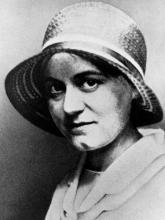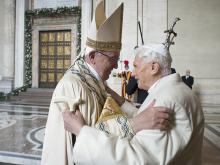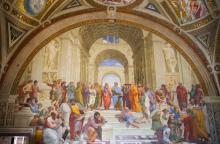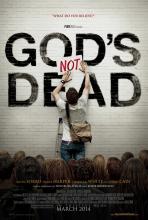philosophy

On the 20th anniversary of her canonization, we have the opportunity to reassess St. Edith Stein’s life and legacy. Instead of remembering her simply as a tragic victim, we can take a deeper look at the work she undertook during her lifetime. Over the course of four decades, Stein dedicated her life to civic engagement and political resistance. From volunteering with the Red Cross in World War I, to participating in the women’s suffrage movement in Prussia, to fighting for equal educational opportunities for women, to writing against the rise of the Nazi regime, Stein is much more than the “Holocaust martyr” – she is the patron saint of political resistance.

The pope spoke of “faithful creativity” in responding to a rapidly changing world. The job of a theologian is to show people what lies at the heart of the Gospel.

I’m not here to argue about whether Paul’s point is a good one — by all accounts, he does a fine job telling the biblical story in a way his gentile listeners can understand. I, like Paul, am a Christ-follower. I’ve already bought what he’s selling. I’m asking about the way he makes his point — I’m pushing back against the notion that Christianity is an idea that can and should be argued in the public square.

Would St. Justin Martyr recognize us as Christians? After reading his, “Discourse to the Greeks,” I have my reservations. I doubt he would recognize me.

From the opening scene to its closing postscript, God’s Not Dead tells a story of persecution and courage, focusing on a young white man named Josh Wheaton (Shane Harper). “Mr. Wheaton,” as he is referred to in various parts of the movie, finds himself in a predicament on the first day of his Philosophy 150 course. In a scene that echoes Rome’s historic persecution of Christians, the powerful intellectual Professor Jeffrey Radisson (Kevin Sorbo) stands before his class of impressionable students and tells them they can skip the section of the course that discusses the existence of god, if each of them signs a piece of paper that says “god is dead.” The professor makes it clear that this proposal is more of a threat when he slowly and emphatically informs his students that the section on god’s existence is where “students have traditionally received their lowest grades of the semester.” This is Mr. Wheaton’s unexpected predicament: can he sign a piece of paper that proclaims god, as a philosophical category and concept, is dead? And if he decides not to sign that paper, can he have the courage to face the consequences?

It's odd that Christians — people who claim to believe that God created the earth, sustains it day by day, and intends to create a new earth — are often so mixed up about sex and food. How long would the earth's inhabitants last without coupling and eating?
And yet most Christian writers right up to the 16th century praised celibacy, sexless marriages, and arduous fasting. Bless Martin Luther for loving his wife (and the beer she brewed), but lots of us still seem to think that good sex and good food — if not actually sinful — are at least pretty low on the religious values hierarchy.
Has it escaped our attention that, according to our most sacred literature, God made a naked male and a naked female, put them in the midst of grain fields and orchards, and told them to multiply?

Most of us know what physics is, but what in the world is metaphysics? One might first recall Meta World Peace, who currently plays for the Lakers. So, metaphysics is just another one of those guys who adopted some sort of weird name, right?
Wrong.
According to John Cobb, a theologian who played a crucial role in the development of process theology, metaphysics asks, "what is it in and of itself that constitutes what is truly real and actual"? In physics you don't quite get to that. Metaphysics deals with ousia, which is substance in Greek. The world is made up of substances and the questions of metaphysics are to understand what substances are.
Woah. That sounds intense.
You can hear more and hopefully understand a little more (via the "substance" of your brain) HERE, as Cobb talks theology during the Emergent Village Theological Conversation at Claremont School of Theology in California.
As the radio emcee at Homebrewed Christianity describes it, "It's time to nerd out with your geek out."

Step aside Reinhod Bieber — there’s a new 20th century philosopher/pop star in town: Justin Buber. That’s right, the Bieb’s popular songs and tweets and Martin Buber’s existential Jewish thought combine in a way that would have the renowned thinker pulling the hairs out of his mountain-man beard.
One of Buber’s notable contributions to modern Jewish thought centers around the distinction of I-Thou (a holistic, infinite relation shared between people or God) and the I-It (a disconnected objectified relation). But if you’re Justin Buber , it might look something like this:
“Tonight I’ma be with u, shawty with u. For the space between two beings is where God may occur.” - October 26, 2011
One of the highlights of the fall for me was undertaking a kind of Occupy Tourism. I was spending most of my time on the move, working to build the broad coalition that eventually won at least a temporary victory against the proposed Keystone XL pipeline from the tar sands of Alberta. In almost every city I visited, I tried to stop by the local encampment, in part because Occupiers were among our most reliable allies, and in part because it was so much fun.
I’ve gotten to speak through the human microphone in lower Manhattan and tour the D.C. campsite just a few blocks from the White House. But I’ve also gotten to sign the copies of my books in the library tent at Occupy Boston (a quiet tent, staffed by honest-to-God librarians from Boston Public Library, with everything arranged by subject). I even made it to foreign occupations—standing beneath a giant stone lion in the grand Vancouver encampment. Happiest occupation goes to San Luis Obispo, California, where I got a hug from a fellow with a huge “Free Hugs” sign. The most chic, not surprising, was Santa Fe, New Mexico, where they arranged not only a campfire for my talk, but a rising full moon in the desert sky.
Did Jesus ever withhold love or healing for fear that he would give up too much of himself?
Did Jesus ever worry that the nature of God would change if he ate at certain tables, or touched certain kinds of people?
Of course not.
The Bible tells us that Jesus continually stepped out of the normative comfort zones of his day to extend his message of radical reconciliation.
I realized that my hesitation to embrace all people interested in an interfaith vision was mostly about my own fear, my own lack of faith. There was nothing Christ-like about it.
Deep down I don't believe in the separation of church and state. Oh, I am against the idea of a state church or giving political preference to one religious sect or another, but it's the idea that somehow people can divorce their religious identity from their political identity that I just can't accept. That either our religion or our politics mean so little to us that we could restrict them to compartmentalized spheres in our lives seems absurd to me. I know people attempt to do it all the time, believing in the modern myth that an individual can assume an objective stance in this world, but reality is a lot more complex than that.
The forthcoming dedication of the national memorial monument honoring Rev. Dr. Martin Luther King, Jr., affords an opening for considering the complexity and meaning of his leadership. He was not the tamed and desiccated civil hero as often portrayed in the United States around the time of his birthday, celebrated as a national holiday. He was until the moment of his death raising issues that challenged the conventional wisdom on poverty and racism, but also concerning war and peace.
King was in St. Joseph's Infirmary, Atlanta, for exhaustion and a viral infection when it was reported that he would receive the 1964 Nobel Peace Prize. As Gary M. Pomerantz writes in Where Peachtree Meets Sweet Auburn, this was the apparent cost exacted by intelligence surveillance efforts and the pressures of learning that Attorney General Robert F. Kennedy had formally approved wiretaps by the Federal Bureau of Investigation. His evolving strength as a leader is revealed in his remarks in Norway that December, which linked the nonviolent struggle of the U.S. civil rights movement to the entire planet's need for disarmament.
The other day the mail brought an advertisement for something I desperately need (or so the ad suggested). If I ordered it right now, the ad said, I would save a hefty percentage off the usual price. In vain I searched the flyer for the price. None was listed -- not the total, not my monthly payment. I was apparently supposed to place my faith in the kindly marketers and order it anyway.
I guess I should be used to this sort of marketing. After all, that's how our federal government does business. Shall we a. fight a war in Iraq? b. add a war in Afghanistan? c. subsidize medical care for seniors and the poor? d. rescue failed financial institutions? e. subsidize growers of corn and soybeans? or f. fund interstate highways?
In one of the most-viewed articles on FoxNews.com several weeks ago, writer Onkar Ghate presents a choice of competing moralities between Ayn Rand and Jesus. While his exegetical powers leave much to be desired, he is correct in noting that the choice many Americans will have to make, as far as political philosophies go, is between Ayn Rand and Jesus.
The mainstreaming of Rand is, in large part, the work of one man (and his money).
